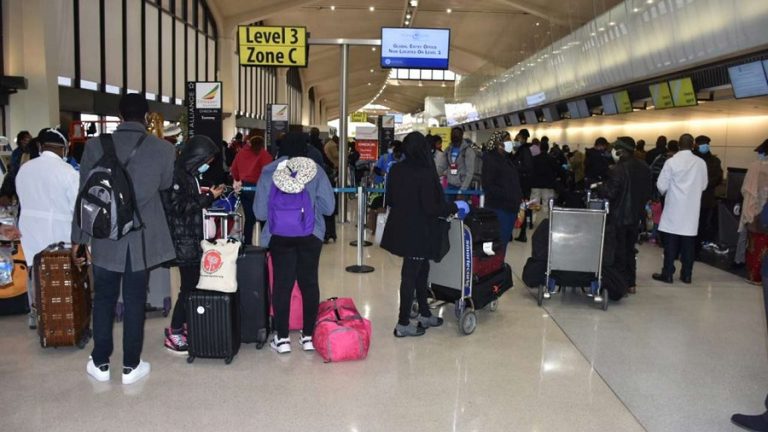Emigration has emerged as a top issue for the average Nigerian resident in the search for better opportunities and an improved standard of living.
Over half (52%) of Nigerian professionals surveyed recently by Phillips Consulting said they are considering quitting their current positions and relocating overseas in the next year.
According to data from the UK’s Higher Education Statistics Agency, there are now 64% more Nigerian students enrolled in universities nationwide.
This translates to 21,305 students by the 2020–2021 school year, up from 13,020 in the 2019–2020 academic year.
Additionally, 65,929 Nigerian students received visas from the UK in 2022 to study overseas. Furthermore, 14,438 Nigerians were enrolled at various US colleges for the 2021–2022 academic year, compared to 13,745 pupils in Canadian universities.
Relocating overseas isn’t an easy choice by default. However, it can be worthwhile. But there are a lot of things to think about before deciding on such a path.
How will your family manage? Are you able to meet the financial obligations? Above all, to which location are you moving? Are you able to make ends meet?
Make sure you have enough money to live alone before deciding to move. Make a thorough monthly budget that reflects your intended use of funds. Put your monthly income and expenses down on paper first.
Consider any additional expenses you could have while making your budget for moving out. This covers things like rent, food, utilities, and transportation.
If you were a housewife, it’s possible that you used most of your income for frivolous expenses like entertainment.
You might have to make some adjustments in this area if you relocate alone. Next, deduct your out-of-pocket costs from your earnings.
If this figure is negative, you must either make more money or cut back on your spending to live within your means.
Make plans for how you will use the money that remains if the result is positive.
Maintain emergency savings
Creating an emergency fund is a critical step in making wise and secure moves. This is a savings account that you can utilize to cover unforeseen costs before needing to borrow money or deplete your retirement funds.
Start modestly and set up an emergency fund. Set aside three to six months’ worth of living expenses before you move to cover unforeseen costs like medical bills, insurance deductions, and vacations.
You can easily save enough emergency money if you have a reliable source of income and are committed to maintaining it each month.
Regarding your income, be realistic
- “What is the salary range for this job?” is the last and unquestionably most significant question. I am aware that judgments about employment are typically greatly influenced by one’s financial situation, also known as the “money factor.”
If you move to an area with a lower cost of living while maintaining a similar standard of living, you might make more money.
But don’t be fooled by the large compensation. Using a cost comparison tool is the best method to handle the financial component.
These helpful calculators provide you with a comprehensive overview of which places cost what by factoring in salary and location.
Factor in rent charges
The income-to-rent ratio of 3:1 is one of the factors that landlords frequently consider when selecting renters. This implies that having a monthly income that is three times your rent is ideal.
When determining if you can afford to rent on your own, this is a helpful generalization. You must make at least $2,400 per month to comfortably pay the $800 rent you’re considering without placing a heavy financial burden on your family.
You might have to move into a smaller home or postpone leaving until you have enough money if you are unable to pay the rent.
Consider roommate options
Moving out isn’t contingent on getting a roommate. However, since roommates may pay a high price, renting with a roommate is a terrific method to save money on rent.
You might be able to live in a larger apartment than you can afford thanks to your roommate.
One of the top priorities for many young Nigerians living in cities is to leave the country by 2023. Some of the key factors influencing this decision include the deplorable living circumstances, rising levels of insecurity, economic instability, upcoming general elections, a change in leadership, and radical measures including the elimination of gasoline subsidies.
But Japa necessitates thorough planning and funding. Just think of the planning needed for a cross-country move—relocating to a new city might be challenging enough.
Do you understand how to use exchange rates correctly?
Before you leave, make sure you understand how to use currency rates. Being informed is the first step toward getting a good rate.
By keeping you from exchanging money at a significantly disadvantageous rate, it will save you a significant amount of money.
Find out this information before you set off on your trip and periodically check the rate to stay aware of any substantial changes.
Make use of a debit card that has no costs for ATM withdrawals and minimal or no fees for overseas transactions.
If you can’t avoid per-transaction ATM fees, remember that a single, larger withdrawal often results in higher savings than multiple, smaller ones.

